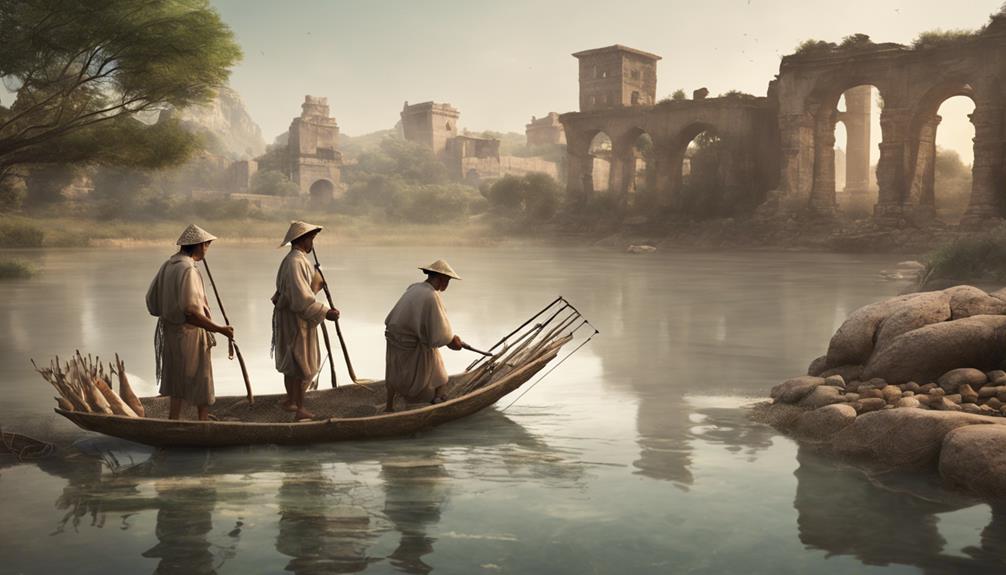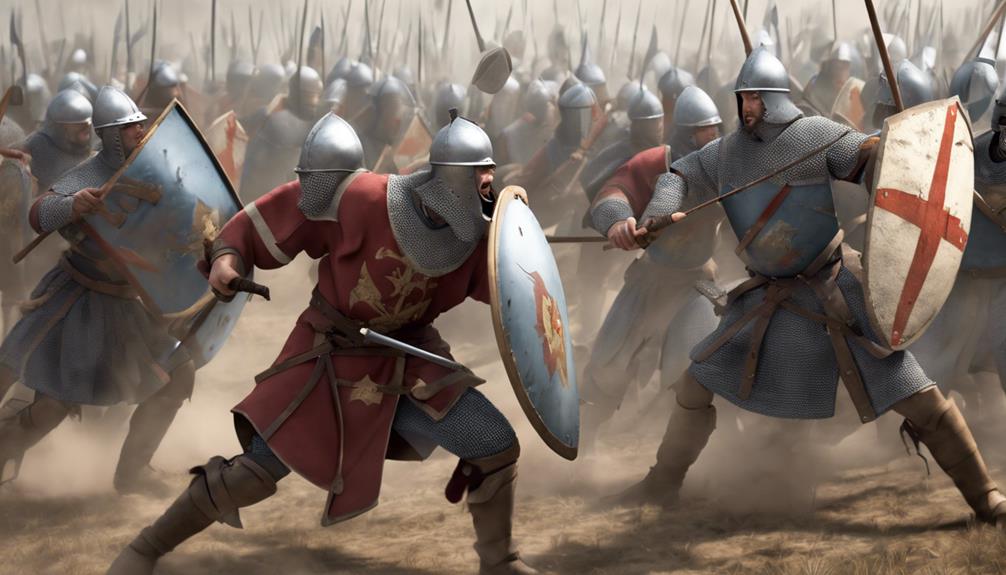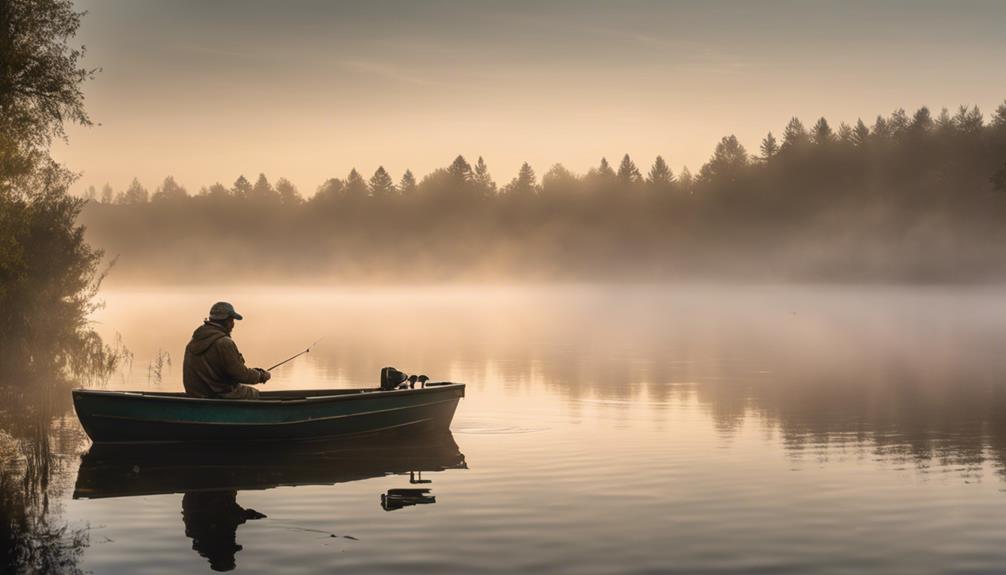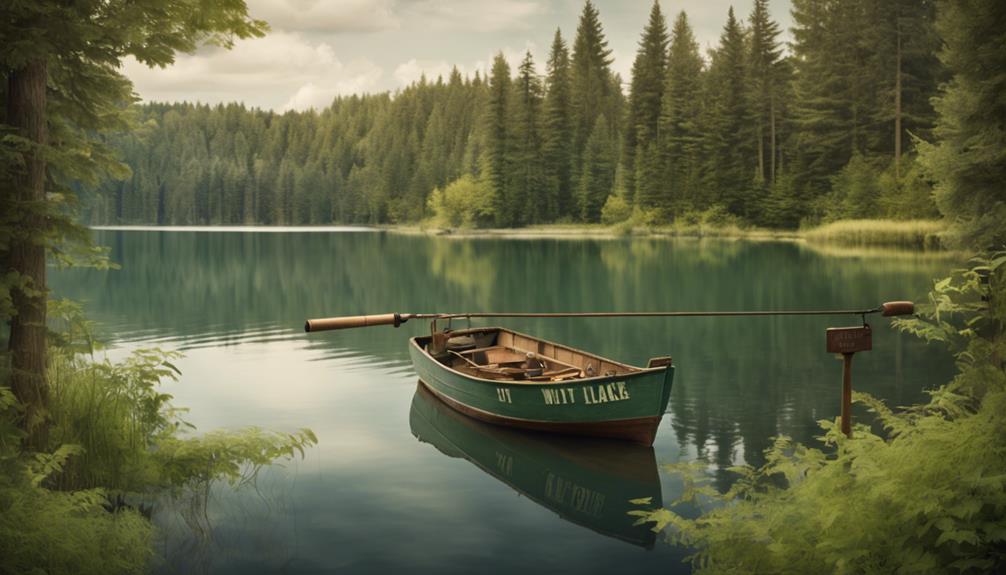In the vast ocean of ancient history, angling emerges as a hidden treasure waiting to be uncovered. Imagine the secrets that lie beneath the surface, waiting to reveal the intricate tapestry of angling's role in shaping civilizations.
As you journey through the corridors of time, you will unearth fascinating insights into how this humble practice transcended mere survival, weaving its way into the very fabric of ancient societies. Join this exploration to discover the profound impact angling had on cultures, economies, and belief systems of bygone eras.
Origins of Angling in Ancient Times
Angling has been practiced since ancient times, with evidence suggesting its origins date back thousands of years. Early methods of angling involved simple tools like hooks made from wood, bone, or stone, along with lines crafted from plant fibers. Historical significance is attached to these rudimentary angling techniques, as they provided ancient civilizations with a means of sustenance and trade. Fish played a vital role in the diets of many societies, making fishing a crucial activity for survival.
In ancient Egypt, fishing wasn't only a means of food production but also held religious importance. Depictions of fishing scenes can be found in Egyptian art and hieroglyphics, showcasing the cultural significance of angling in that era. Similarly, in ancient China, fishing was a respected art form and a way to demonstrate skill and patience.
Throughout history, angling evolved from being solely a means of survival to a recreational activity enjoyed by many. The early methods of angling paved the way for the development of more sophisticated fishing techniques that we use today. Understanding the historical significance of these ancient angling practices gives us insight into the cultural, social, and economic importance of fishing in early civilizations.
Evolution of Fishing Techniques
Tracing back through history, the evolution of fishing techniques reveals a fascinating progression from basic tools to complex methods. In ancient times, fishing started with primitive methods like hand gathering, using spears, and traps. As civilizations developed, so did fishing techniques. The use of nets emerged, allowing for larger catches and more efficient fishing.
Technological advancements further revolutionized fishing. The invention of hooks and lines enabled anglers to target specific fish species with greater precision. The development of fishing rods improved casting distance and accuracy, making it easier to reach fish in deeper waters.
In addition to tools, advancements in watercraft played a significant role in the evolution of fishing. Early civilizations used simple rafts and canoes to access fish in lakes and rivers. Over time, boats became more sophisticated, with the introduction of sails and eventually engines, allowing fishermen to explore farther waters and increase their catch.
The evolution of fishing techniques showcases humanity's ingenuity and adaptability in utilizing resources for sustenance. From humble beginnings with primitive methods to embracing cutting-edge technology, the art of fishing has continuously evolved to meet the needs of societies throughout history.
Cultural Significance of Angling
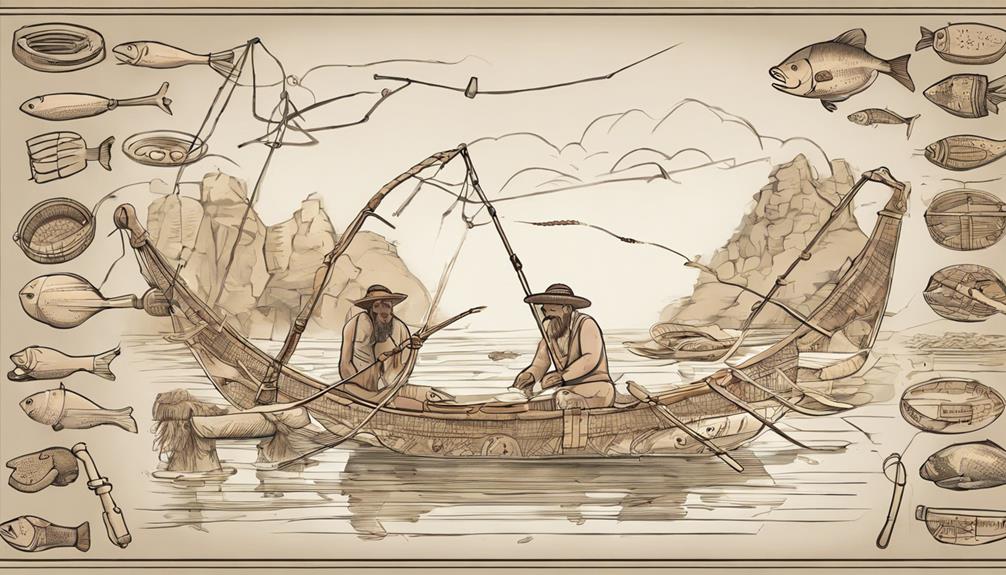
As fishing techniques evolved over time, the cultural significance of angling became increasingly prominent in societies worldwide. Angling goes beyond a mere method of catching fish; it holds deep-rooted connections to societal structures and historical symbolism.
Throughout history, angling has been intertwined with various cultural practices and beliefs. In many societies, fishing wasn't just a means of sustenance but also a symbol of abundance, prosperity, and even spiritual connection to nature. Traditional practices surrounding angling often involved rituals and ceremonies to honor the fish and show gratitude for the resources provided by the waters.
Today, angling continues to play a vital role in the cultural fabric of many communities, albeit with modern interpretations. Fishing tournaments, for example, have become a popular way to celebrate the art of angling and foster camaraderie among enthusiasts. These events not only showcase fishing skills but also serve as a platform for sharing knowledge and preserving angling traditions.
The cultural significance of angling extends beyond the act of catching fish; it serves as a bridge between the past and the present, connecting generations through shared experiences and a reverence for nature. Angling's ability to evoke nostalgia for traditional practices while adapting to modern interpretations highlights its enduring importance in today's society.
Angling as a Source of Survival
Can you imagine a scenario where fishing becomes not just a leisure activity but a critical means of survival? In ancient times, angling served as a fundamental survival skill for many civilizations. Fishing wasn't merely a pastime but a vital source of sustenance, especially in regions where agriculture faced challenges or during times of scarcity.
In historical contexts, angling played a crucial role as a food source. Communities relied on the ability to fish to supplement their diets and ensure their survival. Fish provided a rich source of protein, essential nutrients, and calories necessary for energy. These communities developed techniques to fish efficiently, using tools such as nets, spears, and hooks to secure their catch.
Moreover, angling as a survival skill extended beyond individual sustenance. Entire communities often depended on successful fishing expeditions to thrive. The ability to fish sustainably and effectively could mean the difference between having enough food to eat or facing hunger and potential famine.
Understanding the significance of angling as a source of survival in ancient times offers insight into how our ancestors adapted to their environments and utilized natural resources to meet their basic needs. Fishing wasn't just a recreational activity; it was a cornerstone of survival strategies that allowed civilizations to flourish in challenging circumstances.
Role of Angling in Trade
Angling played a pivotal role in facilitating trade networks in ancient civilizations. Economic exchange thrived as fishing communities utilized angling not only for sustenance but also for commerce. Fishing vessels became essential means of transportation for trading goods along maritime routes, connecting distant regions and fostering cultural exchange.
Maritime commerce heavily relied on the abundance of fish caught through angling. Fishermen ventured into the seas, not only to feed their communities but also to exchange surplus catches for other commodities. The versatility of fish as a trade item allowed fishing communities to engage in barter systems, strengthening economic ties between different civilizations.
Fishing vessels, specifically designed for angling, played a crucial role in expanding trade networks. These boats weren't only used for fishing but also for transporting goods to distant markets. The efficiency of these vessels enabled merchants to travel longer distances, establishing trade routes that were vital for the economic development of ancient societies.
Depictions of Angling in Art
Depictions of fishing in ancient artworks provide valuable insights into the significance of angling in historical cultures. These artistic representations offer a window into the importance of fishing beyond just a means of sustenance. Here are three key points to consider when exploring the depictions of angling in art:
- Symbolism and Representation: Ancient artworks often portrayed fishing scenes not just as a literal activity but as a symbolic representation of deeper cultural or spiritual concepts. The way in which fish, fishing tools, and fishermen were depicted can reveal a lot about the values and beliefs of the society that created these artworks.
- Technique and Skill: Artists in antiquity paid close attention to the details of fishing techniques, showcasing the skill and precision required in angling. The accuracy with which they depicted fishing tools, such as hooks, lines, and nets, can provide insights into the fishing practices of the time and the level of expertise possessed by fishermen.
- Cultural Significance: The presence of fishing scenes in art across different ancient civilizations highlights the cultural significance of angling. Whether used to depict everyday life, religious ceremonies, or mythological stories, these artworks underscore the enduring importance of fishing in shaping historical societies.
Spiritual and Ritualistic Angling Practices

Exploring the spiritual and ritualistic aspects of ancient angling practices reveals profound insights into the cultural beliefs and traditions of historical societies. Fishing wasn't only a means of sustenance but also a sacred activity intertwined with symbolic rituals and ceremonies in many ancient civilizations.
In various cultures, angling wasn't just about catching fish but a way to connect with the spiritual world. Sacred ceremonies were conducted before setting out to fish, invoking blessings from deities associated with water and abundance. These rituals were believed to ensure a bountiful catch and protect the fishermen at sea. The act of fishing itself was often seen as a metaphor for life's journey, with each catch symbolizing a lesson or a spiritual revelation.
Symbolism played a significant role in ancient angling practices. Fish were revered creatures in many societies, representing fertility, abundance, and even spiritual enlightenment. The act of catching a fish was sometimes seen as a form of communication with the divine, with the fisherman acting as a mediator between the earthly and spiritual realms.
Angling Legends and Folklore
Legends passed down through generations intertwine with the art of fishing, adding a touch of mystery and wonder to the ancient practice. As you delve into the world of angling folklore, you'll discover a realm where mythical creatures and legendary fishermen come to life.
Here are three captivating elements of angling legends and folklore:
- Mythical Creatures: From the elusive water sprites believed to protect fish stocks to the mighty sea serpents said to roam the depths, mythical creatures have long been intertwined with fishing lore. Stories of mermaids luring sailors with enchanting melodies or dragons guarding hidden fishing spots add an enchanting layer to the angler's experience.
- Legendary Fishermen: Throughout history, legendary figures have emerged as symbols of angling prowess. Tales of master fishermen who could communicate with fish or reel in monstrous catches with ease inspire awe and admiration. These legendary fishermen often blur the lines between reality and myth, showcasing the deep reverence societies have held for those skilled in the art of angling.
- Sacred Fishing Rituals: Many cultures have rituals and ceremonies dedicated to ensuring a bountiful catch or appeasing water deities. These sacred practices, passed down through generations, highlight the spiritual connection between humanity and the waters that provide sustenance. Whether it's an offering to the river spirits or a dance to invoke fish abundance, these rituals reflect the deep-rooted beliefs associated with angling.
Frequently Asked Questions
How Did Ancient Civilizations Store and Preserve Their Fish Catch Before the Invention of Modern Refrigeration Techniques?
Before modern refrigeration, ancient civilizations used various preservation methods to store their fish catch. Smoking, salting, drying, and pickling were common techniques.
Fishing traditions often included smoking fish over a fire to remove moisture and prevent spoilage. Salting fish helped draw out water, while drying and pickling preserved fish for longer periods.
These methods allowed ancient societies to enjoy fish beyond immediate consumption, ensuring a more sustainable food source.
Were There Any Specific Rules or Codes of Conduct Surrounding Angling in Ancient Societies?
In ancient societies, fishing traditions were tied to ethical practices and cultural norms. Angling was often governed by specific rules and codes of conduct to ensure sustainability and respect for nature. Fishing regulations varied among different civilizations but generally emphasized responsible harvesting of fish and conservation of aquatic resources.
These guidelines aimed to maintain a balance between human needs and environmental preservation, reflecting the reverence ancient societies had for the natural world.
Did Ancient Civilizations Have Any Beliefs or Superstitions Related to Fishing or Specific Fish Species?
Ancient civilizations held strong beliefs and superstitions about fishing and specific fish species. Fishing practices were often intertwined with cultural significance, with certain rituals and traditions surrounding the act of fishing.
Different civilizations had specific beliefs about the spiritual or symbolic meanings of various fish species, which influenced their fishing practices and customs. These beliefs and superstitions played a significant role in shaping the relationship between ancient societies and the practice of angling.
Were There Any Famous Historical Figures or Leaders Known for Their Angling Skills or Passion for Fishing?
When it comes to fishing techniques and historical figures, there have been many famous leaders and individuals known for their angling skills and passion for fishing.
Angling traditions and cultural significance often played a role in showcasing these figures' prowess with a fishing rod.
These historical figures not only excelled in their respective fields but also found solace and joy in the art of fishing, leaving a lasting legacy in the angling world.
How Did the Role of Women in Angling Differ Across Various Ancient Civilizations?
In various ancient civilizations, women's participation in angling varied greatly. Cultural differences influenced fishing practices, determining the roles women played.
Some societies allowed women to fish freely alongside men, while others restricted their involvement to more domestic tasks like preparing the catch.
Understanding these differences provides insight into the diverse ways women engaged with angling across ancient cultures.
Conclusion
In conclusion, angling has played a significant role in ancient history. It served as a means of survival, trade, and cultural expression. From the origins of fishing techniques to the spiritual and ritualistic practices associated with angling, this ancient activity has left a lasting impact on societies around the world.
Through depictions in art and folklore, angling continues to be a timeless tradition that connects us to our past and the natural world.
